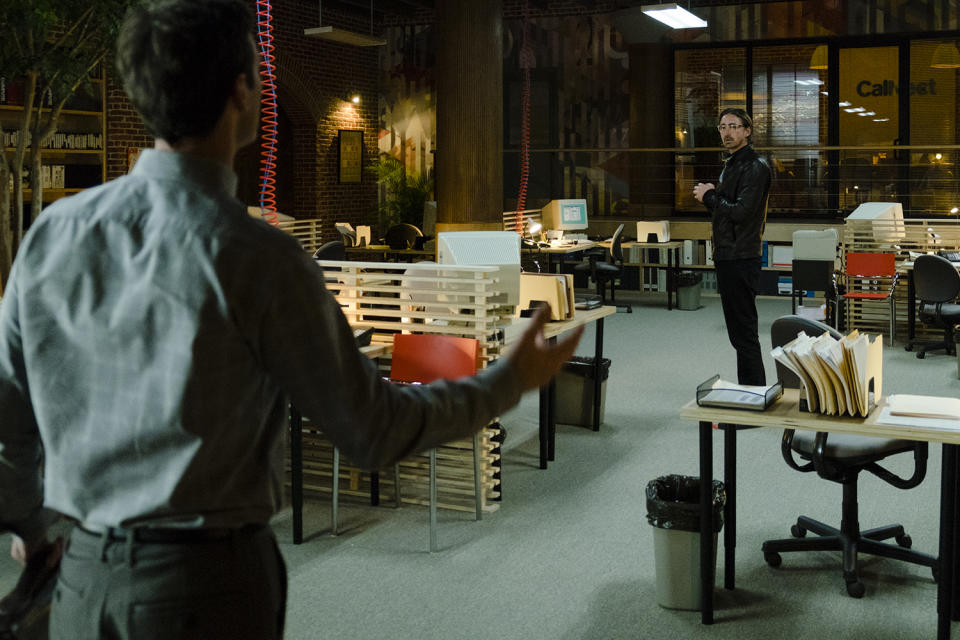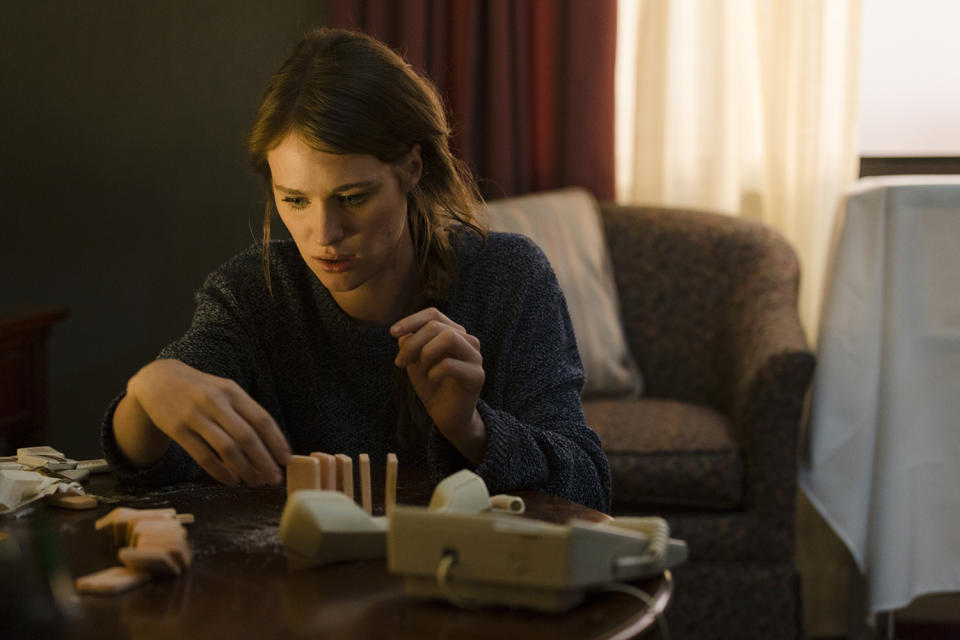'Halt and Catch Fire' Season 4 preview: What the future of the internet holds
Adapt or die — it’s survival of the fittest in the world of Halt and Catch Fire.
The AMC drama returns for a fourth and final season this Saturday. Last year’s finale ended with Joe (Lee Pace), Gordon (Scott McNairy), and Cameron (Mackenzie Davis) embarking on a journey into the World Wide Web, while Donna (Kerry Bishé) was tossed off the project she’d brought to all of them.
Three years pass by in about 10 minutes at the beginning of the premiere episode, in classic Halt and Catch Fire fashion. Technology has changed a lot, and the characters have too.
Donna is still a total boss at the venture capital firm, as seen in the exclusive clip above. Gordon and Joe have built a successful internet service provider, but the latter is frustrated with Cameron for abandoning their browser — which soon becomes obsolete when Mosaic hits the market. Now Joe is ready for the next idea … but what is it?
Showrunners and creators Christopher Cantwell and Christopher C. Rogers talked to Yahoo TV about what to expect from the last chapter in their story of the age of computers.
Yahoo TV: Last season ended with the main characters embarking into the World Wide Web. How did you decide to fast-forward three years?
Rogers: They had arrived at the idea of an internet browser at the end of Season 3. But in doing our research, we just really felt like nothing was happening for three years. There was this sense that the flash happened and it was followed by a great silence.
So, we tried to lean into that idea: that maybe Joe would be the one guy, the watcher on the wall waiting for the internet to show up for three years. What does that do to a guy who’s used to betting the future and seeing it coming — and then to not have it arrive? What does that do to his confidence, especially at the same time that he is negotiating this really complex thing with Cameron, who at the end of the third season we find out he’s in love with?
That time jump, that move through three years, brings us into the meat of the fourth season. I think we just thought [the time jump] really built intrigue, but also played fair with the emotions of these people and what they’d done to each other the last time we saw them.
Were you not interested in those early years? Did you think those pioneers were boring?
Cantwell: It’s not that we weren’t interested or that it was boring. Actually, it was quite fascinating what people were doing with the web in those first three years. You had people in their own free time building web browsers and experimenting, but it was really just growing by a couple dozen pages every several months.
We really did talk about doing a season of Halt and Catch Fire where it was five characters huddled in Gordon’s living room trying to figure out what a web browser would be while they eat Chef Boyardee for lunch. It would have been a really interesting season.
But I think from where the characters are and the undeniable excitement around the explosion of something like Mosaic when it came out in ‘93, when all of a sudden web pages went from a couple hundred to a few thousand at the end of the year, that to us felt much more in the vein of the kind of storytelling we love to do on Halt when it comes to technology — people groping around the dark for a while and then boom — something crazy happens that they didn’t see coming.

What was your approach knowing this was the final season?
Rogers: One, we felt very lucky to have it. It was a great gift that the network gave us — not only to renew us, but to let us know that was going to be the last one and that we should write the show to conclusion. That’s a fore-notice that most TV shows don’t have; they tend to just kind of fall off suddenly. We always try to write our seasons to a satisfying conclusion each year, like it might be the end with the great hope that it won’t be.
But this year, knowing that, it really opened up the playbook and made everything possible. And I think it also gave us an opportunity to look back and ask, “What has this show been about? What questions have we asked and how should we answer those questions? Should we answer those questions?”
I think we found ourselves looking at a group of people who kept putting themselves into their projects and kept hoping that this would be the one that’s going to make them whole, that’s going to make them complete, that’s going to make them happy. And the same thing was true of their interpersonal relationships — ”this partnership, this coupling, is going to be the thing that finally makes me right.” But by the time the series ends, we spend 10 years with these people. We wanted to give a verdict on their ability to get off that wheel, to step out of that cycle, or to make peace with it. Philosophically, we approached the season from that place.
And also there was just this idea of, “This is it, let’s spend everything we’ve got, let’s use all of our great ideas, and let’s give these people a goodbye they deserve.” Our collaborators, the actors, the writers, everybody up in Atlanta were really up for that. And for my money, having seen a first cut of the finale, I’d like to think we’ve pulled it off.
The show has changed so much from the first season. Do you feel like it mirrors the crazy evolution of technology?
Cantwell: I think it absolutely does. And I think the characters are really going to start to articulate and realize that in Season 4 when they look around and say, “Jeez, this is not what we expected. Even though we expected something, it does look a lot different from what we were imagining back in 1983 when we were working in personal computing.”
And I think that as we touch on the World Wide Web, which is so far from where we started, it does feel of a piece with the actual history of technology in that way. These guys are getting into search and you know, Yahoo is name-checked! This is where you put in the interview, “Full disclosure, this interview is owned and is a subsidiary of Yahoo Inc.” But it is funny when you think about it. You’re interviewing us about a television show when this company started out as something completely different.

The second season teamed up Donna and Cameron, to great success, so why tear them apart at the end of Season 3?
Rogers: I wouldn’t say that was super-premeditated. We learned pretty early on that the success of the show was about listening to it and seeing where it wanted to go, and that had a lot to do with what was fun and what surprised us. Out of the first season, the story of Mutiny was really intriguing to us, and in the second season, it took us on a great startup ride in that dingy house in Texas. And then when the story wanted to move to California, we followed it there.
I think Donna and Cameron’s split really comes out of the characters and their evolution. Donna is somebody who really put her life and her skill set on hold in the first season. Second season, she’s trying something and realizing maybe she’s really good at it. In the third season, that leads naturally for her to want to guide the company in a way that’s counter to the instincts that Cameron has.
We love them together. They were the beating heart of so much of what was working in Season 2 and 3 with the Mutiny storyline. So, it hurt us to split them up, but it felt like where those two people at that point in their lives with their points of view would want to go. We split them up again in the finale of last season, and in Season 4, I think we’ll be very interested in the question of whether they can ever be friends again, much less work together again.

So, we had Joe, Gordon, and Cameron teaming up again, with Donna on the outside and Bosworth off doing his own thing. How do those two come back into play?
Cantwell: It’s different for Bos and Donna in terms of how they return to be in the same technological orbit as Joe, Gordon, and Cameron. Donna has a slew of investment wins in the three years between Season 3 and 4. She’s still looking for the new big idea. She’s looking for something that will cement her status at her VC firm. She’s someone who has been hurt professionally and personally in the recent past and she’s still carrying that with her. I think she fosters paranoia of any perceived threat around her.
She’s looking for something that really sparks her interest and brings her back out of the malaise she’s been in over the last three years. I think Donna’s yearning for that, Joe is yearning for that, Cameron is yearning for that. She’s been totally entrenched in the video game world for a long time. But there is a sense of being at sea. Gordon is the head of a major company, but is that all he needs? Does he need someone to light a spark beneath him?
When they all start dealing with the same kind of emotional wrestling, of course that’s going to lead them down a path that is very similar and have them all kind of collide into each other again as they look for solutions to that problem within.
Halt and Catch Fire airs Saturdays at 9 p.m. on AMC.
Read more from Yahoo TV:

